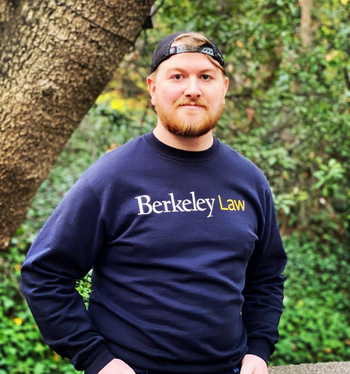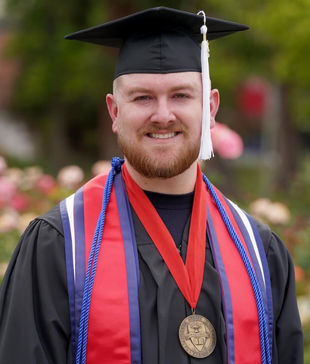Like many Berkeley Law 1Ls, Steven Hensley can point to several glittering achievements on his resume. At Fresno State University, he was named the president’s undergraduate medalist and the dean’s medalist for the College of Arts and Humanities, co-founded a nonprofit, completed two honors projects, and held leadership positions in student organizations.

But other stops on Hensley’s path — incarceration, homelessness, hunger — are decidedly different.
While in prison, he saw a flier for Project Rebound, a California State University system program that helps people reintegrate into the education system. Launched in 1967, the initiative has helped hundreds of formerly incarcerated students attend and graduate from 14 Cal State campuses. The Underground Scholars Initiative, created in 2013 and now active on all nine UC undergraduate campuses, offers similar support.
A California Department of Corrections and Rehabilitation study revealed that 62% of inmates released in 2017 and 2018 had returned to prison by the end of 2019. In contrast, according to a California State University Annual Project Rebound report, no students in the program from 2016 to 2020 recidivated.
Hensley has faced other daunting challenges. While studying for the Law School Admissions Test, he lost a friend to a hit-and-run accident, his sister gave birth to a child dependent on heroin, and his grandmother died of a fentanyl overdose. Nevertheless, he scored in the 96th percentile and now brings a firsthand perspective of the criminal justice system to his classrooms and classmates.
Below, Hensley describes his unusual path to Berkeley Law.
* * * *
At the age of 17, I was arrested and taken to juvenile hall. After a few weeks, my case was transferred to the adult justice system, and I was sentenced to more than a decade in prison. For five years, I was incarcerated at Avenal State Prison. While imprisoned, I longed for the day when the gates would open so I could start anew.
But, just one week before my release, that dream suddenly crashed into pieces. I received a notice from parole stating that I wouldn’t be permitted to return to my county of last residence. So, I was released to a random rural county instead of returning home.
I experienced homelessness. The crisp November breeze numbed my face while I attempted to sleep on a park bench. I knew I had to decide. I could freeze on that bench, or I could take a chance.
Without hesitation, I traveled to local businesses, where I made my case for why they should hire a dirty, homeless person who had recently been released from prison. After eight companies rejected me, I bargained with an employer that I would work for free until they decided to hire me. On the third day of working without pay, I was finally hired.
The employer paid me less than minimum wage, but it was enough to keep me alive. I continued to sleep on the park bench while I worked and saved up money. Before long, it was clear that I would need to take another step forward.
I had heard about Project Rebound, a program that helped formerly incarcerated people attend college. The program was based in Fresno, over 100 miles away. I had never been to Fresno, but I arranged a meeting with my parole office and secured a transfer there.
Upon transferring to Fresno, I secured employment and enrolled in community college courses. After multiple semesters of balancing work and college classes, I initiated the transfer application process and was accepted to Fresno State University. Following my acceptance, I focused on increasing my involvement on campus and in the community.

I led initiatives focused on decriminalizing poverty and excelled as a student. In 2020 I co-founded a nonprofit organization to connect formerly incarcerated youth to employment and educational opportunities. I also served as co-chair of the American Civil Liberties Union (ACLU) Fresno Chapter, where I worked to stop law enforcement from conducting illegal sweeps of homeless encampments.
Recently, I was elected to serve a three-year term on the ACLU of Northern California’s Board of Directors. In 2022, I graduated from Fresno State and was awarded the President’s Medal, the highest honor the university presents to a graduate.
I am no longer freezing or starving on a park bench, but some people are freezing and starving on a park bench, and it is for them that I decided to take another step forward and go to law school. I chose to attend Berkeley Law because it was one of the few institutions that would value my experience as a formerly incarcerated person and prepare me to combat societal injustices. That choice was also motivated by my desire to interact with the Underground Scholars Initiative, which prioritizes services for formerly incarcerated students at UC Berkeley.
I joined the law school community representing the lived experience of those impacted by incarceration and poverty. By harnessing my practical and deeply personal understanding of the justice system, I contribute a uniquely empathetic perspective to theoretical legal discussions.
I experienced a coming of age as I was transferred to and from juvenile, county, and state correctional facilities; those transfers helped me understand the strengths and weaknesses of the U.S. criminal justice system. It is crucial to give a voice to those who have experienced the harsh realities of that system.
Very few people have survived prison and worked their way into a position to attend law school. Knowing that grim reality, I choose to serve as a voice for a severely underrepresented population in the law school community.